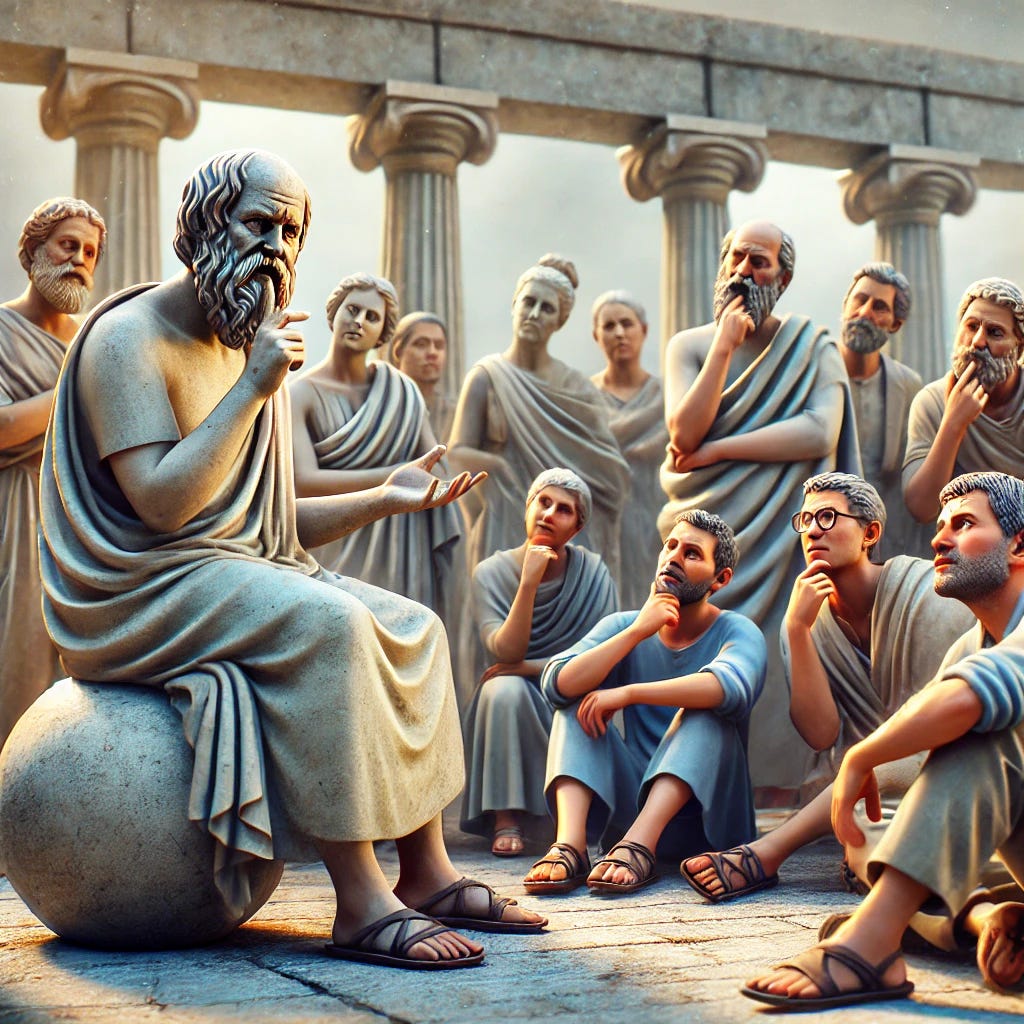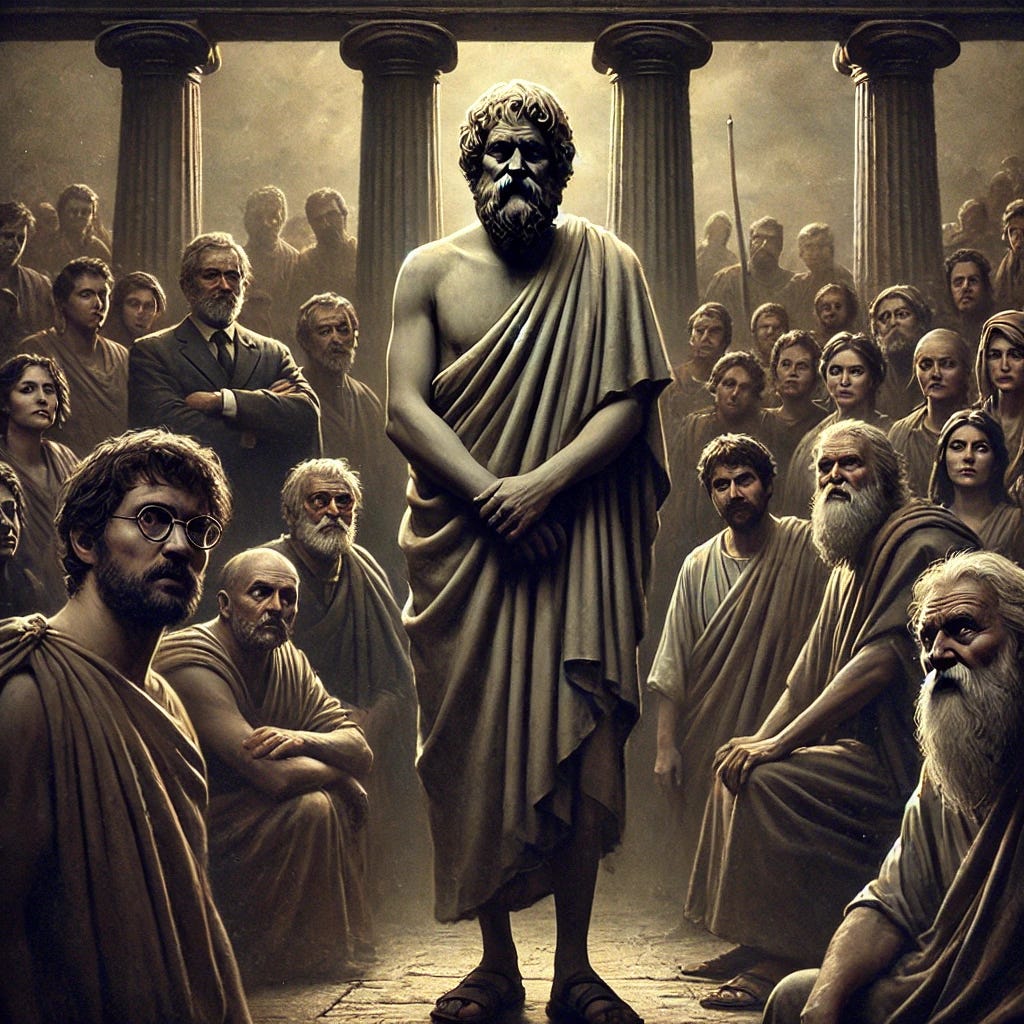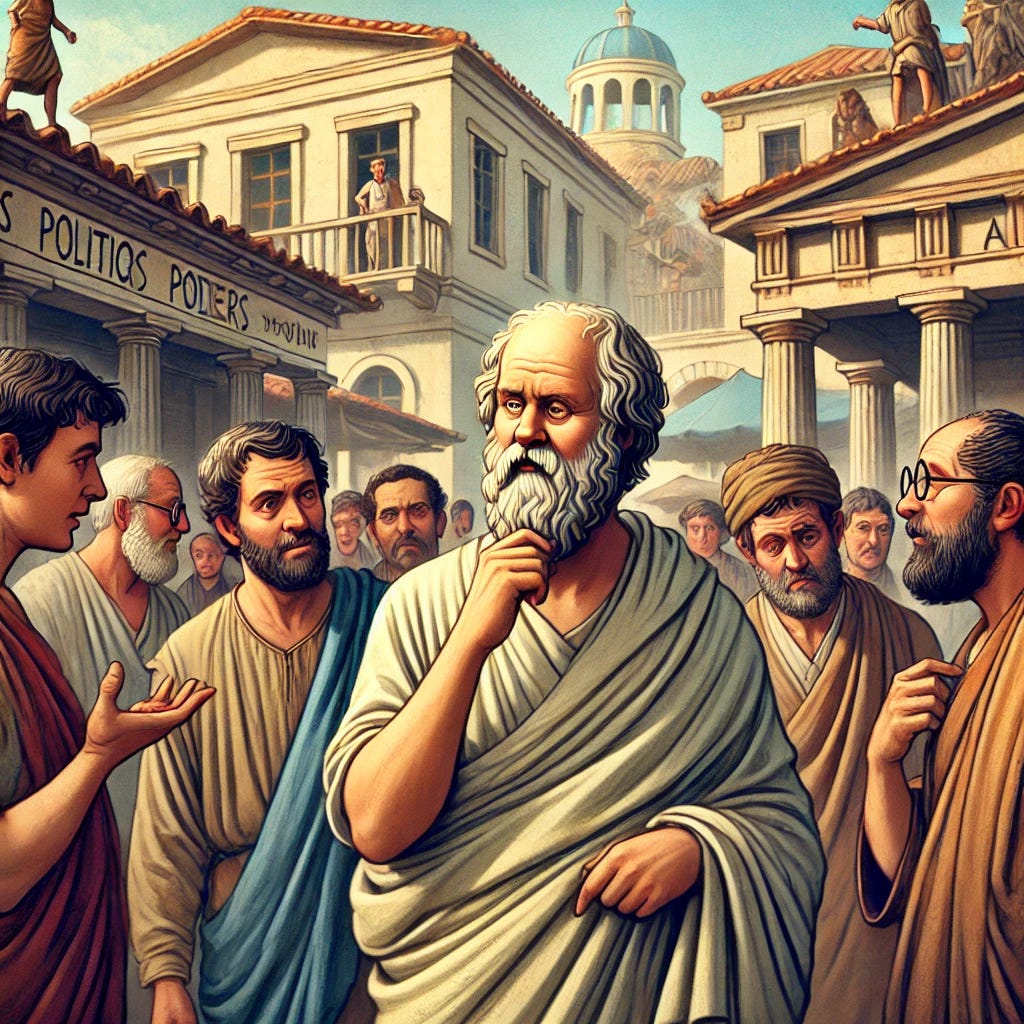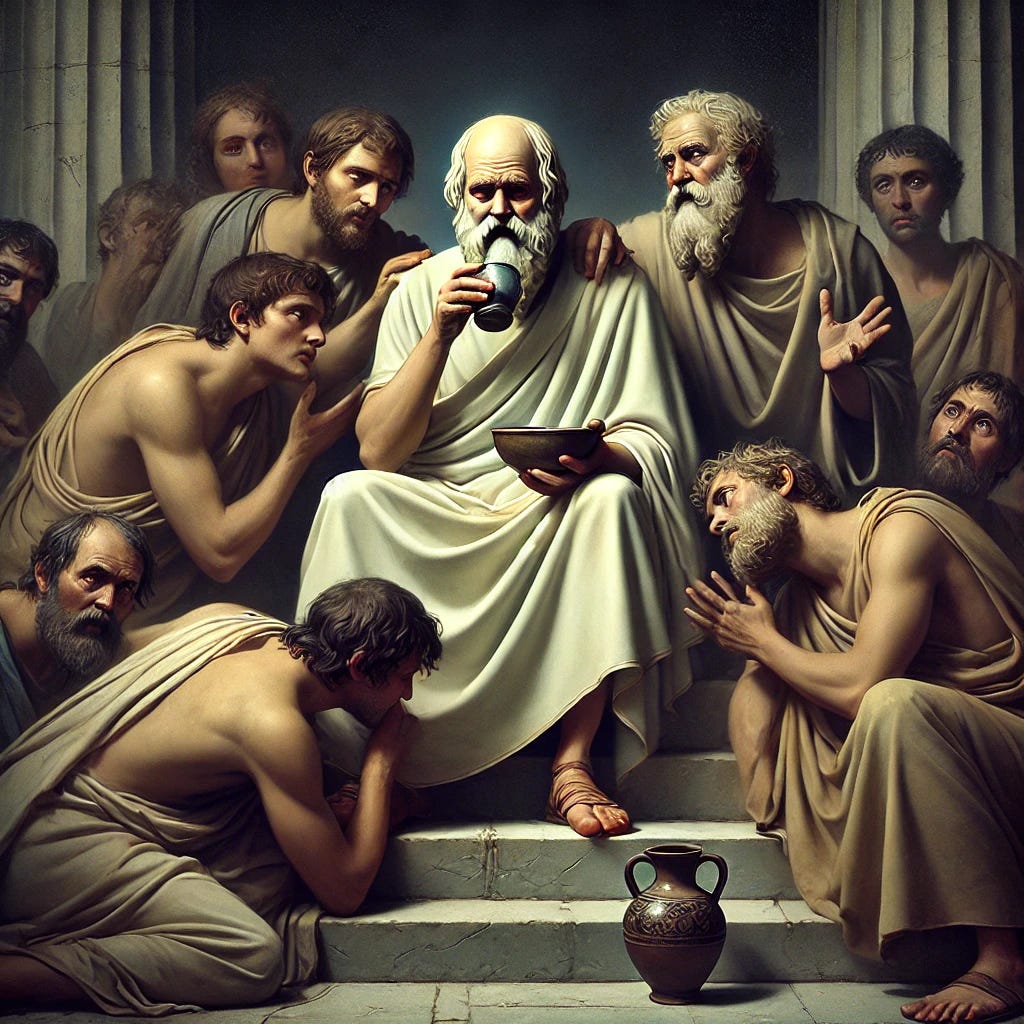How an Ancient Philosopher Changed the Way I Think
What Socrates' Life Taught Me About Living with Purpose, Integrity, and Curiosity
When I first learned about Socrates, I never thought his ancient ideas would influence my life so much.
But the more I explored his life and teachings, the more I realized that Socrates offers timeless wisdom that we can still apply today.
In fact, his philosophy has become a personal guide for how I try to live, think, and grow as a person.
Here are the key lessons I’ve taken from Socrates' life — and how I’m trying to adapt them in my own journey.
1. Ask Questions, Even When It’s Uncomfortable
Socrates was all about asking questions. In fact, he developed a whole method around it, known as the Socratic Method. His goal wasn’t to lecture people or show off how much he knew. Instead, he believed that true wisdom comes from asking the right questions — questions that make you think deeply and challenge what you assume to be true.
My takeaway: I try to ask more questions in life, whether it's about my own beliefs, work decisions, or even conversations with friends. I’ve found that asking thoughtful questions helps uncover new ideas and leads to better understanding. It also keeps me humble, reminding me that there’s always more to learn.
2. Live with Integrity, No Matter the Cost
One of the most famous stories about Socrates is how he was put on trial for his ideas. The authorities in Athens accused him of corrupting the youth and disrespecting the gods. Instead of backing down or changing his views, Socrates stood firm. Even when they sentenced him to death, he refused to give in to fear or compromise his values.
Socrates chose to die for what he believed in. He famously said, “It is better to suffer wrong than to do wrong.” That level of integrity is something that inspires me.
My takeaway: I try to live according to my values, even when it’s tough. Whether it’s standing up for what’s right at work or making difficult personal decisions, I remind myself of Socrates' courage. If he could face death with integrity, surely I can handle life’s smaller challenges with the same mindset.
3. Never Stop Seeking Knowledge
Socrates’ most famous line might be, “I know that I know nothing.” He believed that true wisdom comes from understanding how little we really know. Instead of pretending to have all the answers, he embraced curiosity and continued learning throughout his life.
In one story, Socrates was told that the Oracle of Delphi had said he was the wisest man in Athens. Instead of being flattered, he questioned it. He went around asking other people—politicians, poets, craftsmen—what they knew. The more he asked, the more he realized that most people didn’t know as much as they thought they did. That’s when he realized the Oracle was right: Socrates was wise because he recognized his own ignorance.
My takeaway: This mindset has made me more open to learning. I try not to assume I know everything, even in areas where I feel confident. Every conversation, book, or experience is an opportunity to grow, and Socrates’ humility is a reminder to stay curious and keep learning.
4. Live the Examined Life
Socrates believed in living an "examined life." He once said, “The unexamined life is not worth living.” He constantly reflected on his actions, his thoughts, and his relationships. He wanted to understand himself deeply, believing that self-knowledge was the key to a fulfilling life.
This approach is powerful because it pushes us to look inward and ask the tough questions: What do I want from life? What kind of person am I becoming? Am I living according to my values?
My takeaway: I’ve tried to bring this idea into my own life. Regularly, I reflect on my goals, my relationships, and the way I spend my time. Sometimes, it leads me to make changes — whether that’s cutting out bad habits or spending more time with people who matter. It’s not always easy, but it helps me live with more purpose.
5. Courage in Facing Challenges
Perhaps the most dramatic moment of Socrates’ life was his death. After being sentenced to die, he had the chance to escape. His friends even offered to help him flee Athens. But Socrates refused. He didn’t want to break the laws he had lived by his entire life, even if it meant saving himself.
In the end, Socrates calmly drank the poison hemlock and accepted his fate. His courage in facing death, rather than running away from it, is a powerful reminder of how to approach life’s challenges.
My takeaway: Socrates teaches me not to shy away from difficulties. When faced with challenges, I try to face them head-on rather than avoiding them. It’s not always easy, but Socrates’ example gives me strength to handle tough situations with grace.
6. What the Greatest Philosophers Said About Socrates
Socrates' influence on philosophy is undeniable. Many of history's greatest thinkers have recognized his lasting impact on how we approach wisdom, ethics, and reason. Here are a few notable reflections:
Plato (Socrates' student):
“I am the wisest man alive, for I know one thing, and that is that I know nothing.”
Plato was deeply influenced by Socrates and immortalized his teachings in his dialogues. Through Plato’s works, we understand that Socrates' wisdom was grounded in the humble acknowledgment of his own ignorance. This perspective laid the foundation for Western philosophy.Aristotle:
“Socrates was the first who called philosophy down from the heavens, and placed it in cities, and introduced it into family life, and obliged it to consider the good and evil of things.”
Aristotle recognized Socrates as a revolutionary figure who brought philosophy from abstract thinking into practical, everyday life. By questioning moral and ethical matters, Socrates encouraged people to think critically about the choices they made.Immanuel Kant:
“The greatest of all reformers of the depraved morality of our world was Socrates.”
Kant admired Socrates for his moral integrity and the way he challenged the corruption of his time. Socrates' emphasis on living a virtuous life and prioritizing moral values over societal norms resonated deeply with Kant's own moral philosophy.Friedrich Nietzsche:
“Socrates is the turning point in world history. His life and death serve as the highest example of the instinct to live according to reason.”
Nietzsche viewed Socrates as a transformative figure who redefined the role of reason in human life. He saw Socrates’ life and death as the ultimate embodiment of rational living, emphasizing logic and integrity over emotional or instinctual decisions.Ralph Waldo Emerson:
“Socrates was a great example of how you don’t have to have material wealth to be rich in mind and spirit.”
Emerson highlighted Socrates' belief that a rich life doesn’t come from wealth or status, but from wisdom, knowledge, and inner virtue. This ideal deeply influenced transcendentalist philosophy.
Socrates may have lived over 2,000 years ago, but his life and ideas are as relevant today as ever. From his unwavering commitment to truth, to his relentless curiosity, to his courage in the face of death, Socrates offers lessons that I strive to live by.
By applying these principles to my own life — asking questions, seeking knowledge, living with integrity, and embracing challenges — I hope to continue growing, learning, and becoming a better person.
Socrates once said, “The unexamined life is not worth living.” And for me, following his path means living a life that’s examined, thoughtful, and full of purpose.
7. Socrates and His Connection to Indian Philosophy
While Socrates lived in ancient Greece, his philosophy shares some intriguing parallels with the ideas that emerged from ancient Indian philosophical traditions. Though there is no direct historical evidence of a connection between Socrates and Indian philosophy, scholars have often drawn comparisons between his ideas and those found in Indian texts like the Upanishads and Bhagavad Gita. Here’s why Socrates’ philosophy resonates with Indian thought:
Self-Examination and Inner Knowledge
Socrates emphasized self-examination and famously said, “Know thyself.” This idea mirrors the teachings of the Upanishads, which emphasize self-knowledge (Atma Vidya) as the key to understanding the deeper truths of life. In both traditions, self-inquiry is seen as the path to wisdom and spiritual fulfillment.The Pursuit of Virtue
Like Socrates, Indian philosophy places a high value on living a virtuous life. In the Bhagavad Gita, Lord Krishna speaks of Dharma (righteous duty) and living in accordance with one’s values, much like how Socrates believed that living a life of virtue was more important than wealth or power.The Courage to Accept Death
The way Socrates faced death with calm acceptance has often been compared to the teachings of the Bhagavad Gita, where Lord Krishna advises Arjuna not to fear death, as the soul is immortal. Socrates’ belief in a higher realm of truth beyond the physical world aligns with the Gita's philosophy of the eternal soul and the transient nature of physical existence.Questioning and Seeking Knowledge
Socrates’ method of questioning to seek knowledge resonates with the Indian tradition of debate and inquiry. In ancient India, philosophers engaged in Shastrartha (philosophical debates) to seek higher truths, much like Socrates used dialogue and questioning to uncover wisdom. Both cultures valued intellectual humility, knowing that wisdom comes from understanding how little we truly know.











Very nice. Super 👏👏🎉🎉🥳🥳🙌🙌🙏
Very nice 👌